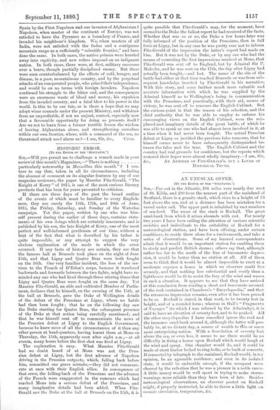HISTORIC ERROR.
[TO THE EDITOR OF THE “SPECTATOR.")
SIR,—Will you permit me to challenge a remark made in your review'of this month's Magazines,—" There is nothing particularly noteworthy in Macmillan this month" ? I ven- ture to say that, taken in all its circumstances, including the absence of comment on its singular features by any of our magazine reviewers, the paper by Maurice Fitz-Gerald, " The Knight of Kerry" of 1815, is one of the most curious literary products that has been for years presented to criticism.
If there are three days of the past the broad outline of the events of which must be familiar to every English- man, they are surely the 16th, 17th, and 18th of June, 1815, the Friday, Saturday, and Sunday of the Waterloo campaign. Yet this paper, written by one who was him- self present daring the earlier of those days, contains state- ments of his own doings which are certainly inaccurate, and is published by his son, the late Knight of Kerry, one of the most perfect and well-informed gentlemen of our time, without a hint of the fact that what is described by his father is quite impossible, or any attempt to suggest the very obvious explanation of the mode in which the error occurred. If any facts of history are certain, they are that the famous ball at Brussels took place on the night of June 15th, and that Ligny and Quatre Bras were both fought on the 16th. One very familiar incident, the loss of the ser- vices to the French of D'Erlon's corps, because it wandered backwards and forwards between the two fights, might have re- minded any one who had lived through those stirring times that Ligny and Quatre Bras were fought on the same day. Yet Maurice Fitz-Gerald, an able and cultivated Member of Parlia- ment, declares that he himself, on the evening of the 15th, at the ball at Brussels, gave the Duke of Wellington details of the defeat of the Prussians at Ligny, where no battle had then been fought ; that he on the following day saw the Duke starting for Quatre Bras, the subsequent presence of the Duke at that action being carefully mentioned; and that he was himself sent off to communicate the news of the Prussian defeat at Ligny to the English Government, because he knew more of all the circumstances of it than any other person at head-quarters, having learnt them at Mons on Thursday, the 15th, apparently soon after eight a.m.,—at all events, many hours before the first shot was fired at Ligny. The explanation is easy. What Maurice Fitz-Gerald had no doubt heard of at Mons was not the Prus- sian defeat at Ligny, but the first advance of Napoleon driving in the Prussian outposts, which, falling back before him, committed one grave mistake,—they did not communi- cate at once with their English allies. In consequence of that error, the falling-back of the Prussians and the advance of the French were exaggerated in the rumours which had reached Mons into a serious defeat of the Prussians, and many imaginative details had been added. When Fitz- Gerald saw the Duke at the ball at Brussels on the 15th, it is quite possible that Fitz-Gerald's may, for the moment, have seemed to the Duke the fullest report he had received of the facts. Whether that was so or no, the Duke a few hours later was fully informed of the position of the Prussians, then in full force at Ligny, but in any case he was pretty sure not to inform Fitz-Gerald of the impression the latter's report had made on him. But it was not by the Duke, or by any one who had the means of correcting the first impressions received at Mons, that Fitz-Gerald was sent off to England, but by Admiral Sir P. Malcolm, and he was sent on the 17th, the day after Ligny had actually been fought, —and lost. The name of the site of the battle had either at that time reached Brussels or was from sub- sequent knowledge inserted by Fitz-Gerald in his narrative. With this story, and some further much more valuable and accurate information with which he was supplied by the Admiral himself as to Wellington's being in communication with the Prussians, and practically, with their aid, secure of victory, he was sent off to reassure the English Cabinet. But the curious point is that the reason of his selection, and the chief authority that he was able to employ to enforce his encouraging views on the English Cabinet, were the mis- placed and imaginary details of the great battle, of which he was able to speak as one who had almost been involved in it, at a time when it had never been fought. The actual Prussian defeat at Ligny so justified the previous false rumours, that he himself seems never to have subsequently distinguished be- tween the false and the true. The English Cabinet and the country had real grounds for confidence, but the reports which restored their hopes were almost wholly imaginary.—I am, Sir,
&c., As: ADMIRER OF FITZ-GERALD'S, BUT A LOVER OF
HISTORICAL TRUTII.


































 Previous page
Previous page